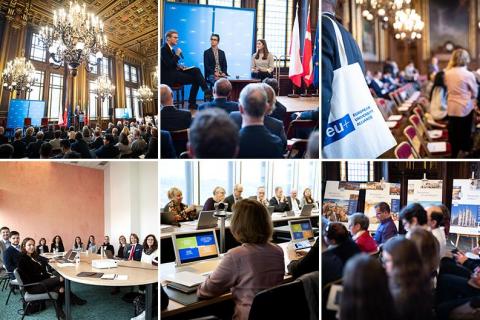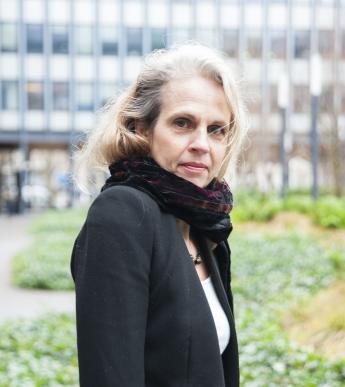
Building Tomorrow’s European University
Interview with Isabelle Kratz, new Secretary General of the 4EU+ Alliance.

On January 1, 2021, Isabelle Kratz became the new Secretary General of the 4EU+ Alliance. Her international background and her experience in academia are great assets in the orchestration between the six member universities and when presenting the Alliance to European authorities.
What has been your career path?
Isabelle Kratz: As a graduate of the Ecole Nationale des Chartes, my career as a paleographer archivist eventually led to broadening my work into education and research. As a historian and library curator, I have long worked in the service of students and teachers. In particular, I managed the university library of the former Pierre and Marie Curie University, before becoming head of the library of the Swiss Federal Institute of Technology in Lausanne for eight years, where I developed an expertise in open science.
In concrete terms, what is 4EU+ at Sorbonne University?
I. K.: 4EU+ extends the horizons of all members of the university community. Thanks to 4EU+, a student will be able to join courses developed jointly by several partners. They will benefit from opportunities in physical or virtual mobility among other members of the Alliance. Academic researchers will be able to develop common courses with their colleagues within 4EU+. They will be able to go and teach in partner universities and compare their pedagogical approaches.
For Sorbonne University staff, 4EU+ is an opportunity to discover other cultures and working methods in the six universities of the Alliance. Finally, this international scientific community represents a formidable natural reservoir of partnerships for researchers from the six universities, enabling them to submit national or European projects together.
Why did you choose to be the Secretary General of 4EU+?
I. K.: In September 2020, I had the opportunity to take over the operational coordination of the 4EU+ European University project, before applying last November for the position of Secretary General. Having French and German roots, I have always been interested, because of my personal history, in European projects. As a library curator, I worked in a job that naturally lead to cooperative activities, especially international ones. 4EU+ was therefore a perfect opportunity for me to contribute to the construction of the European area of education, research and innovation by working alongside colleagues from six countries.
What is your initial assessment of the first years of the Alliance's existence?
I. K.: We have gone from close collaboration to a true joint construction of a European University sharing the same values for education and research: academic freedom, access to university education for all, multiculturalism, the desire for openness and a common interest in current societal issues. Since its creation, 4EU+ has put in place a structure, governance and several working groups that bring together the expertise of each institution. This alliance is not just a cooperation agreement, but a dynamic structure that continues to move forward.
What impact has the pandemic had on the Alliance?
I. K.: In spite of the delay the pandemic has caused on some projects, it has, in a way, highlighted the common strengths of our six universities: the capacity to adapt, the strong reactivity and concern for our students. It has also provided an opportunity to accelerate the development of projects planned as part of 4EU+, such as the preparation of a virtual campus and the implementation of flexible and innovative joint online courses. Finally, it has enabled the institutions to strengthen their ties through a form of solidarity so that our projects can continue to move forward despite the difficulties related to the health crisis.
What will be your mission within this alliance?
I. K.: With my team, my mission is to ensure the smooth day-to-day running of 4EU+ and to provide support to the governance of the Alliance in functional, operational and strategic terms. We need to synergize the strengths of all the partners so that cooperation is as productive as possible.
Externally, my role is to represent 4EU+ in international bodies, starting with the European Commission and its departments, but also with other academic alliances whose objectives could be closer to ours. European Universities are a priority on the agenda of the European Commission. There is therefore every reason to affirm our place and the influence we can have on the strategic decisions and orientations that will be defined by Europe in the field of research and education.
What prospects do you see for the future?
I. K.: Because 4EU+ brings together universities of excellence, we would like to develop cooperation and synergies on the research side in addition to the education projects already underway. We will also continue to strengthen the identity of the 4EU+ community by offering mobility opportunities to the entire university community. We also want to increase the visibility of the Alliance in our local communities and beyond. Finally, our goal is for this European University to be able to structure and finance itself in a sustainable way with national and European support.
What message would you like to convey to the Sorbonne University community?
I.K.: 4EU+ offers great opportunities for all Sorbonne University members. Participating in cutting-edge European research, in the education of future European citizens, in the construction of the international university of tomorrow is a stimulating challenge for everyone. This is why I invite all those who are interested in the perspectives offered by the Alliance in terms of education, research or mobility, to contact the 4EU+ team at Sorbonne University.
